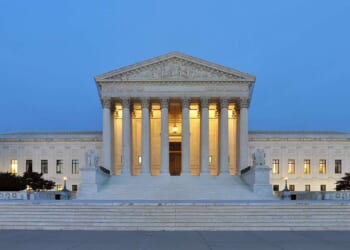Trans activists and allies have criticised today’s ‘evil’ Supreme Court decision ruling on the definition of a woman, accusing lawmakers of attacking minority groups and putting them at risk, and setting the community ‘back 20 years’.
There were calls amongst the LGBT+ community to ‘amplify trans voices’ and warnings that Britain was ‘following in the footsteps of Trump’s America’ after judges decided the definition of sex in the Equality Act is binary.
The likes of broadcaster India Willoughby, Drag Race UK stars Tayce and Tia Kofi and leading LGBT+ charities spoke out after the judgement was handed down this morning.
Lord Hodge said the five Supreme Court justices had unanimously decided that ‘the terms woman and sex in the Equality Act refer to a ‘biological woman and biological sex’.
The ruling has been celebrated by women’s rights activists including author JK Rowling, but its opponents say they fear it could put trans and non-binary people at renewed risk of attacks and discrimination.
The judgement marks the culmination of a long-running legal battle between the Scottish government and a women’s group over the definition of a ‘woman’ in Scottish legislation mandating 50 percent female representation on public boards.
The case centred on whether somebody with a gender recognition certificate (GRC) recognising their gender as female should be treated as a woman under the 2010 Equality Act.
Lord Hodge recognised ‘the strength of feeling on both sides’ and cautioned against seeing the judgement as ‘a triumph for one side over another’, stressing that the law still gives trans people protection against discrimination.
In a post on X, formerly Twitter, the Good Law Project said in a statement: ‘The Supreme Court sided with FWS [For Women Scotland]. But it didn’t hear from a single trans person.

Broadcaster and Loose Women co-host India Willoughby said the ruling marks a ‘dark day’ for the transgender community

Model Munroe Bergdorf said the trans community will ‘get through this together’ and urged LGBT+ people to ‘hold each other close’
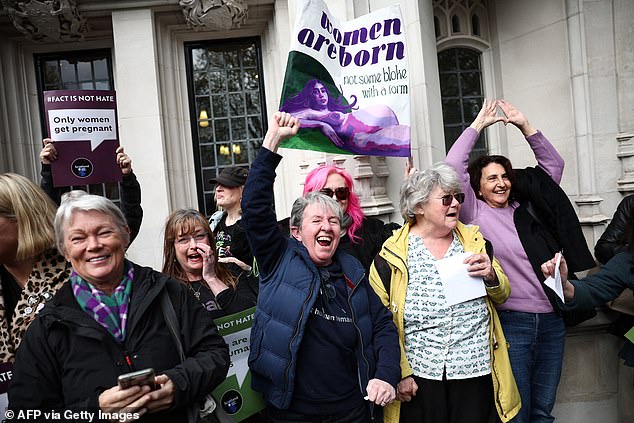
The Supreme Court has announced that the definition of a woman is based on biological sex in a landmark ruling. Pictured: Campaign group For Women Scotland celebrating the judgement
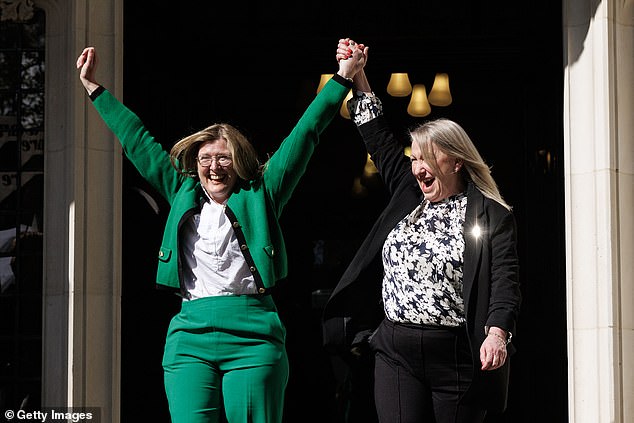
For Women Scotland directors Susan Smith (left) and Marion Calder (right) celebrate today’s landmark ruling
‘This ruling sets a dangerous precedent and erases trans women from protections. It puts trans rights back 20 years. We won’t stop fighting for trans rights.’
In an 88-page ruling, the justices said: ‘The definition of sex in the Equality Act 2010 makes clear that the concept of sex is binary, a person is either a woman or a man.’
The decision could have far-reaching implications on how sex-based rights apply, including how women-only spaces are allowed to operate.
Reacting to the ruling, broadcaster and journalist India Willoughby, who was Loose Women’s first transgender co-host, said the decision marked a ‘grim day for Britain’.
Stars of Drag Race UK were amongst prominent members of the LGBT+ community to offer trans people support, with many taking to social media.
Drag queen Tayce posted: ‘UK supreme court is a POS [piece of s***].
‘My heart goes out to all my trans brothers and sisters eternally but more so today. Nothing or no-one can erase YOU.’
Co-star Bimini Bon-Boulash shared an image stating: ‘Trans women are women’.
And Tia Kofi uploaded a video to Instagram in which they said: ‘We now more than ever must be allies to the trans community.
‘It cannot just be trans people who are expected to raise their voices to fight for their own existence.
‘It must be exhausting to constantly be the ones to fight for your own existence. As allies it is our responsibility to amplify their voices.’
Model and trans activist Munroe Bergdorf said the LGBT+ community will ‘get through this together’ as she took to Instagram in the wake of the ruling.
‘Spending the next few days listening/speaking to legal experts about how this will impact the future of our community in the UK,’ she said.
‘In the meantime, please hold each other close.’
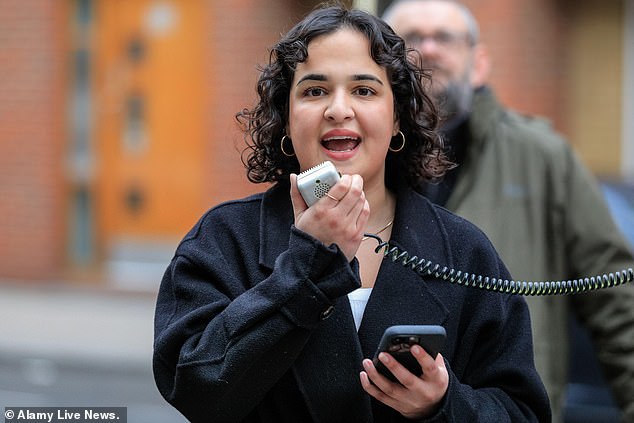
Labour MP Nadia Whittome said she was ‘deeply disappointed’ with the ruling and ‘stands in unwavering solidarity with the trans community’
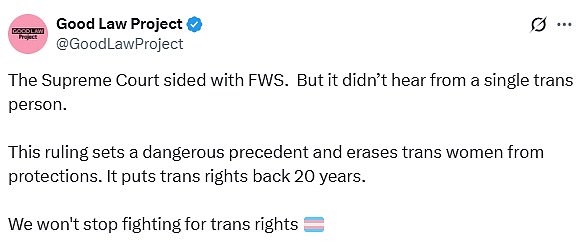
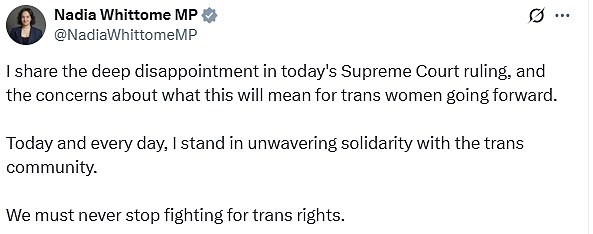
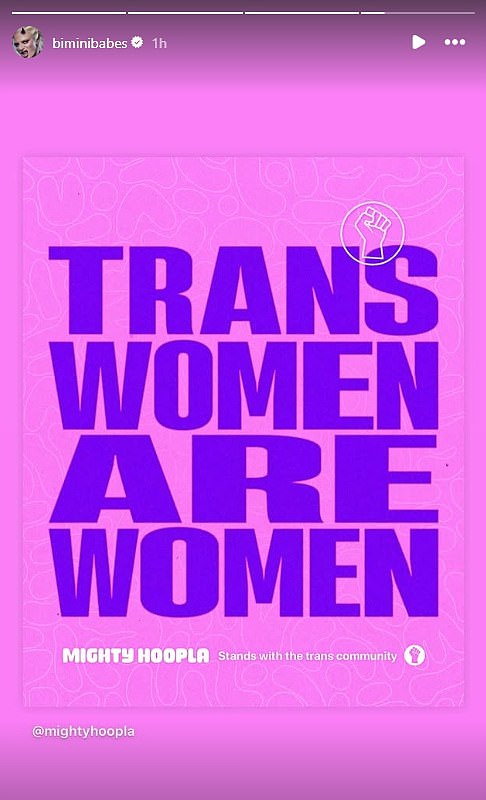
Drag artist Bimini Bon-Boulash shared an image on their social media stating: ‘Trans women are women’
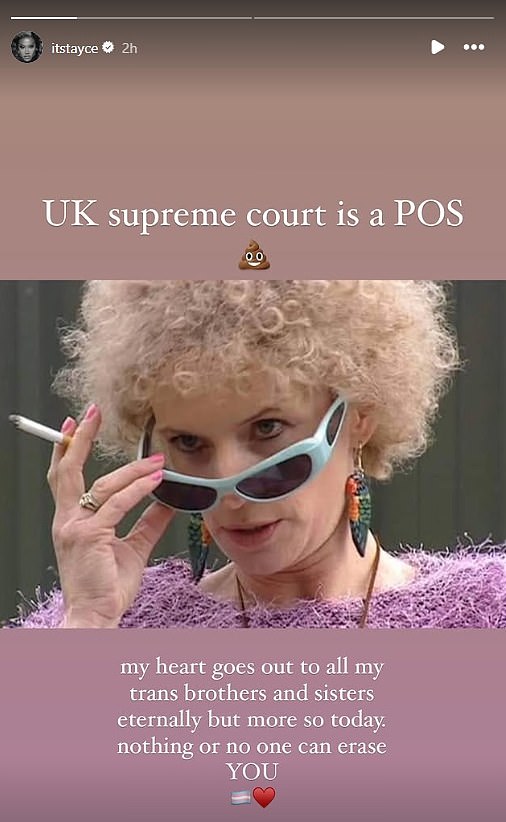
Stars of Drag Race UK were amongst those to speak out in criticism of today’s ruling
Posting on X, formerly Twitter, Labour MP Nadia Whittome said: ‘I share the deep disappointment in today’s Supreme Court ruling, and the concerns about what this will mean for trans women going forward.
‘Today and every day, I stand in unwavering solidarity with the trans community. We must never stop fighting for trans rights.’
And activist Heather Herbert told the BBC the ruling means the UK risks ‘following in the footsteps of Trump’s America.’
The former Scottish Labour candidate said urgent ‘clarification’ is needed on the implications of the ruling, which she said continues a trend of ‘attacking minorities.’
LGBT+ charity Stonewall’s chief executive Simon Blake said: ‘[This ruling] will be incredibly worrying for the trans community and all of us who support them.
‘It’s important to be reminded the Court strongly and clearly re-affirmed the Equality Act protects all trans people against discrimination, based on gender reassignment, and will continue to do so.
‘Once we read and fully digest the judgement, we will work with stakeholders across all sectors to provide as much clarity as possible.’
In the judgement, Lord Hodge accepted the trans community are ‘a vulnerable and often harassed minority’ who have a right to protection from discrimination on the basis of their identity in place of their biological sex.
The Scottish government had argued that trans people are entitled to sex-based protections, while campaign group For Women Scotland (FWS) claimed they only apply to people that are born female.
The action sought to overturn a decision by the Scottish courts in 2023 which found that treating someone with a GRC as a woman under the Equality Act was lawful. The outcome will have implications in England, Scotland and Wales.
In handing down the court’s judgement, Lord Hodge said: ‘The unanimous decision of this court is that the terms ‘woman’ and ‘sex’ in the Equality Act 2010 refer to biological woman and biological sex.’
‘In a judgement written by Lady Rose, Lady Simler and myself, with whom Lord Reed and Lord Lloyd-Jones agree, we unanimously allow the appeal,’ he added.
Lord Hodge said: ‘But we counsel against reading this judgement as a triumph for one or more groups in our society at the expense of another. It is not…
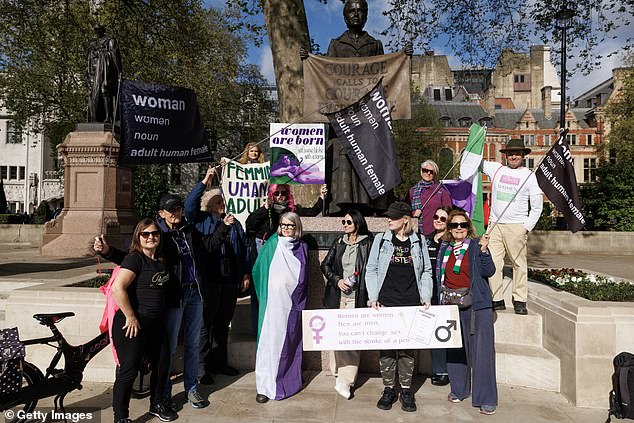
Lord Hodge said that five Supreme Court justices had unanimously decided that ‘the terms woman and sex in the Equality Act refer to a ‘biological woman and biological sex’
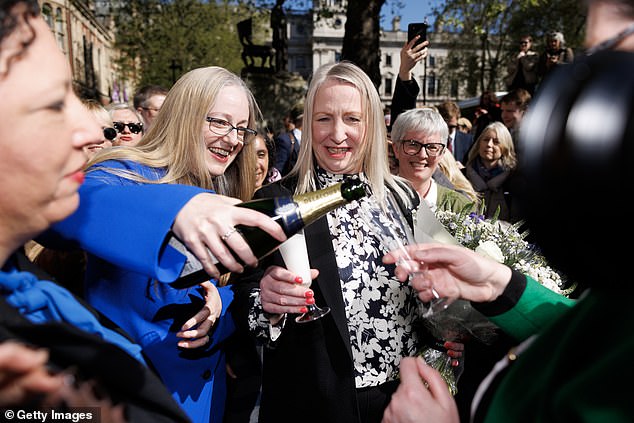
Marion Calder (centre), Helen Joyce (centre left) and Maya Forstater (left) celebrate outside the Supreme Court
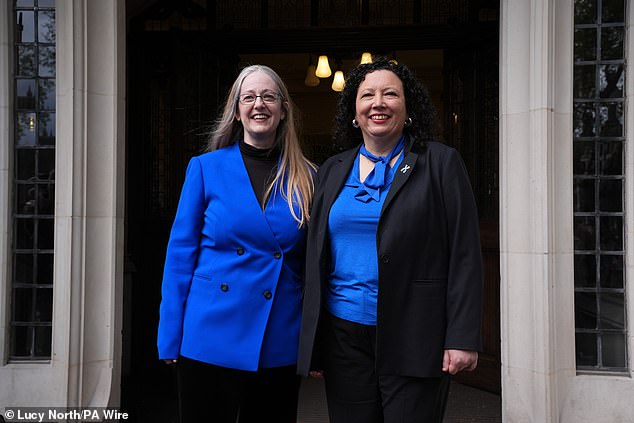
Campaigners Helen Joyce (left) and Maya Forstater of Sex Matters smile outside court after the landmark ruling
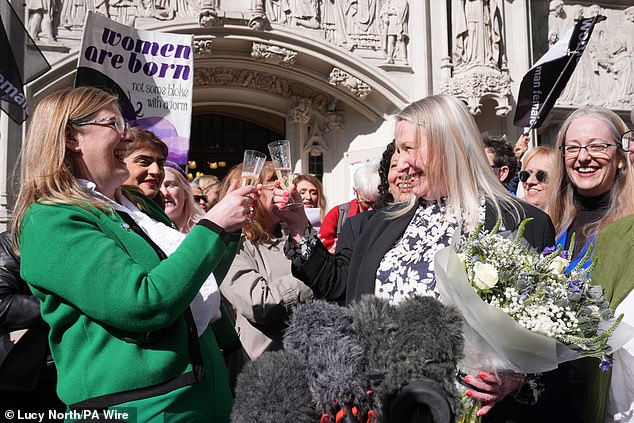
The judgement was celebrated by women’s rights groups who opened a bottle of champagne. Pictured: Susan Smith (centre left), Marion Calder (centre right) and Helen Joyce (right)
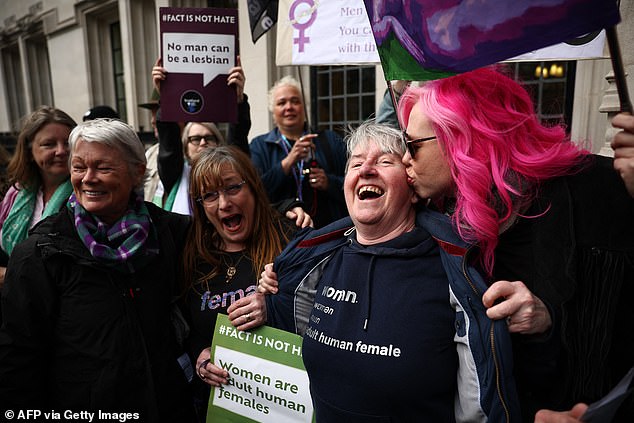
Crowds of people cheered and broke into song after the ruling was handed down
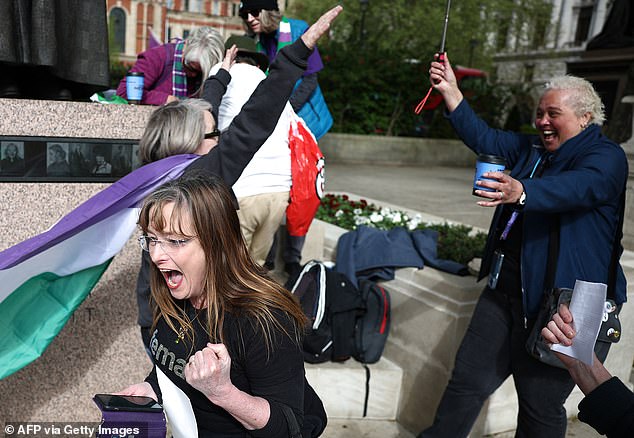
But a furious protester shouted ‘trans rights are human rights’ at those gathered, adding: ‘Even if you kill every last one of us another will be born tomorrow’
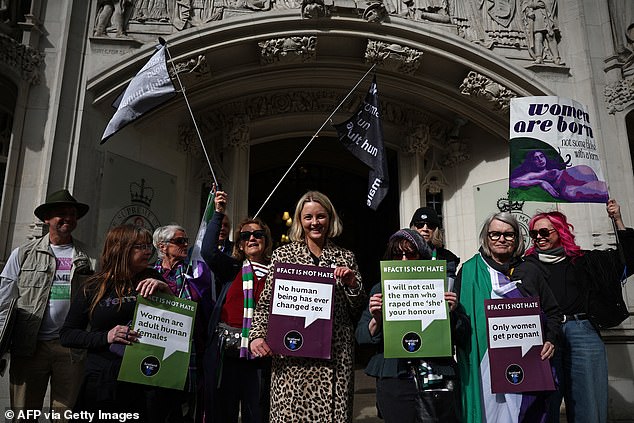
The case centred on whether somebody with a gender recognition certificate (GRC) recognising their gender as female should be treated as a woman under the 2010 Equality Act

The Scottish government argued that such people are entitled to sex-based protections, while campaign group FWS claimed they only apply to people that are born female
‘The Equality Act gives transgender people protection not only against discrimination through the protected characteristics of gender reassignment, but also against direct discrimination, indirect discrimination, and harassment, in substance in their acquired gender.’
He recognised the ‘strength of feeling on all sides’ which lies behind the case, adding: ‘On the one hand women, who make up one half of the population, have campaigned for over 150 years to have equality with men and to combat discrimination based on their sex. That work still continues.
‘On the other hand, a vulnerable and often harassed minority, the trans community, struggle against discrimination and prejudice as they seek to live their lives with dignity.’
Following the ruling, Amnesty International said in a statement: ‘The outcome of today’s judgment is clearly disappointing. It is a long and complex judgment, and we will take time to analyse its full implications.
‘There are potentially concerning consequences for trans people, but it is important to stress that the court has been clear that trans people are protected under the Equality Act against discrimination and harassment.
‘The ruling does not change the protection trans people are afforded under the protected characteristic of ‘gender reassignment’, as well as other provisions under the Equality Act.
‘Amnesty intervened in this case to remind the court that legal gender recognition is essential for trans people to enjoy the full spectrum of rights each of us is entitled to, including safety, health and family life.
‘The Supreme Court itself today made clear that the vilification of a marginalised minority group is absolutely wrong.’
‘All public authorities in the UK need to unequivocally enforce protections for trans people against discrimination and harassment.’
And Labour for Trans Rights said: ‘The Supreme Court’s decision is hugely disappointing, and a result of ceaseless lobbying from a well-funded anti-trans network with links to the global far-Right.
‘We will continue to fight against all attempts to strip trans people of their rights, and will use all levers within the Labour Party to make trans voices heard.’
The judgement was celebrated by some women’s rights groups, who cheered outside the court, opened a bottle of champagne and broke into song after the ruling was handed down.
But a furious protester shouted ‘trans rights are human rights’ at those gathered, adding: ‘Even if you kill every last one of us another will be born tomorrow.’
Marion Calder, co-director of FSW which successfully challenged the Scottish Government, told the Daily Mail that she is ‘absolutely’ delighted by the judgement.
‘As I’m sure the vast majority of women across Great Britain feel,’ she said.
‘Even today we had absolutely no idea which way this was going to go. We’re just a grass routes organisation that started up in my living room ten years ago with absolutely nothing but a plan to fight back to maintain women’s rights.
‘We actually thought that if we just spoke to governments either here in Westminster or up in Scotland that they would listen, but we were unfortunately mistaken.’
She said that she ‘certainly hopes’ it draws a line under the gender debate, adding: ‘In day to day life, you can go around and it doesn’t really matter what your sex is.
‘But in certain circumstances it is very important, such as prisons or women’s sport, changing rooms or rape crisis centres. This is where it’s actually important.’
Maya Forstater, chief executive of human rights charity Sex Matters which intervened in the case, also said she is ‘delighted’ by the outcome.
She added: ‘We are delighted that the Supreme Court has accepted the arguments of For Women Scotland and rejected the position of the Scottish Government.
‘The court has given us the right answer: the protected characteristic of sex – male and female – refers to reality, not to paperwork.’
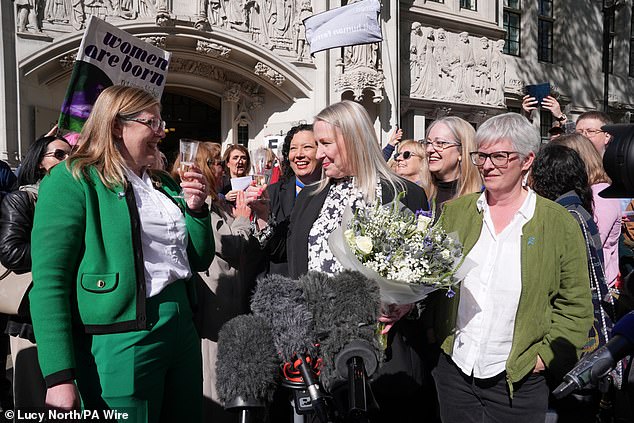
Marion Calder (centre), co-director of FSW which successfully challenged the Scottish Government, told the Daily Mail that she is ‘absolutely’ delighted by the judgement
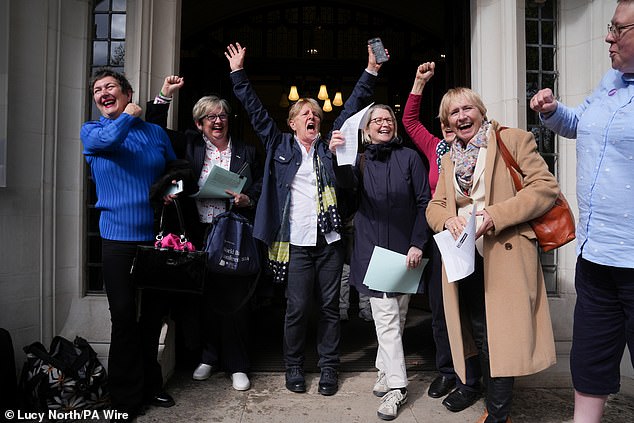
The outcome will have implications in England, Scotland and Wales
Conservative party leader Mrs Badenoch praised campaign group FWS.
‘Saying ‘trans women are women’ was never true in fact, and now isn’t true in law either,’ she said.
‘This is a victory for all of the women who faced personal abuse or lost their jobs for stating the obvious. Women are women and men are men: you cannot change your biological sex.
‘The era of Keir Starmer telling us women can have penises has come to an end. Well done to For Women Scotland!’
While Mims Davies, the shadow minister for women, hailed it as a ‘clear victory for common sense’.
JK Rowling said: ‘It took three extraordinary, tenacious Scottish women with an army behind them to get this case heard by the Supreme Court and, in winning, they’ve protected the rights of women and girls across the UK.’
Baroness Kishwer Falkner, chair of the Equality and Human Rights Commission, said: ‘Today the Supreme Court ruled that a gender recognition certificate does not change a person’s legal sex for the purposes of the Equality Act.
‘We are pleased that this judgment addresses several of the difficulties we highlighted in our submission to the Court, including the challenges faced by those seeking to maintain single-sex spaces, and the rights of same-sex attracted persons to form associations.
‘As we did not receive the judgment in advance, we will make a more detailed statement once we have had time to consider its implications in full.’
The United Nation’s special rapporteur on violence against women and girls praised the ruling as a ‘triumph of reason and facts’.
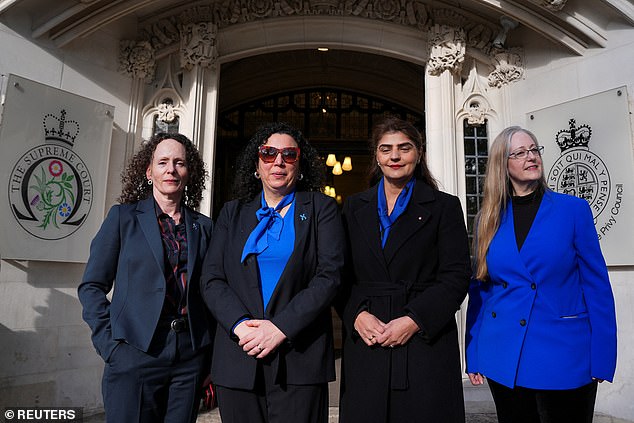
Fiona McAnena, Maya Forstater, Pam Ghosal and Helen Joyce stand outside the Supreme Court after the ruling
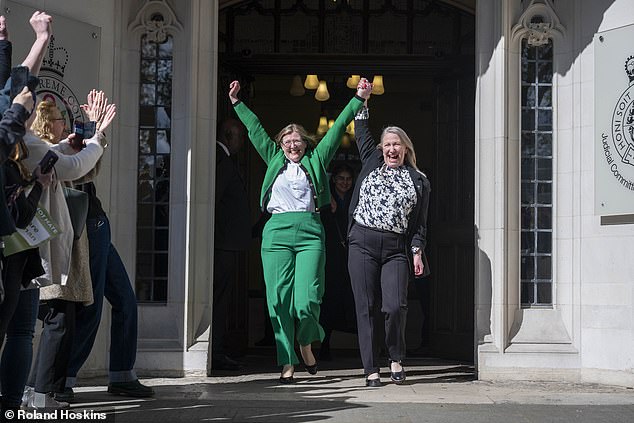
Susan Smith and Marion Calder celebrate as they walk out the Supreme Court following the verdict
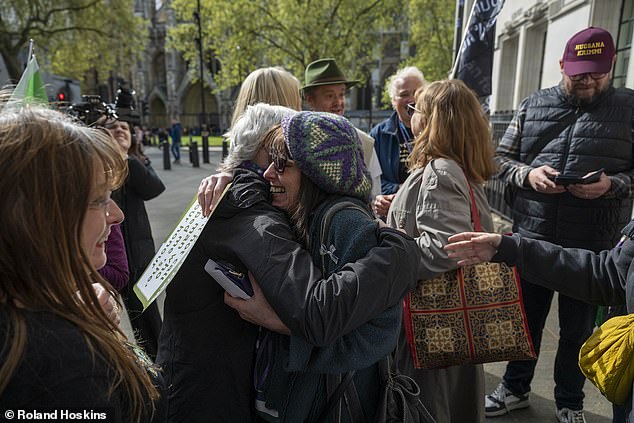
Women were seen celebrating and hugging after the landmark ruling that trans women are not legally women
‘I welcome this decision by the UK Supreme Court holding that the term ‘man’ ‘woman’ and’sex’ in the Equality Act of 2010 refers to biological sex,’ Reem Alsalem said.
‘It represents the triumph of reason and facts based deliberations and the return of common sense.
‘Congratulations to For Women Scotland and all their allies that have supported them in their quest to uphold the rights of women to equality and non-discrimination.
‘The ruling is a recognition that the erasure of the ordinary meaning of sex in law and in policies has rendered it impossible to upholding the protection [of] women, including lesbians on the basis of the characteristic of sex. Beyond the UK, I hope other jurisdictions are paying attention to this groundbreaking ruling.’
Lara Brown, Policy Exchange Senior Research Fellow for culture and identity, said: ‘By confirming that ‘sex’ in the Equality Act 2010 means ‘biological sex’, the Supreme Court has secured women’s sex-based rights – rights to which they have always been entitled as a matter of law.
‘While this is a welcome victory, it should never have been left to the courts to answer the question of ‘what is a woman?.
‘Had the Government used their statutory powers to clarify that sex in the Equality Act 2010 means biological sex, when Policy Exchange called for them to do in 2023, the Scottish Ministers would never have been able to issue unlawful advice on the subject.’
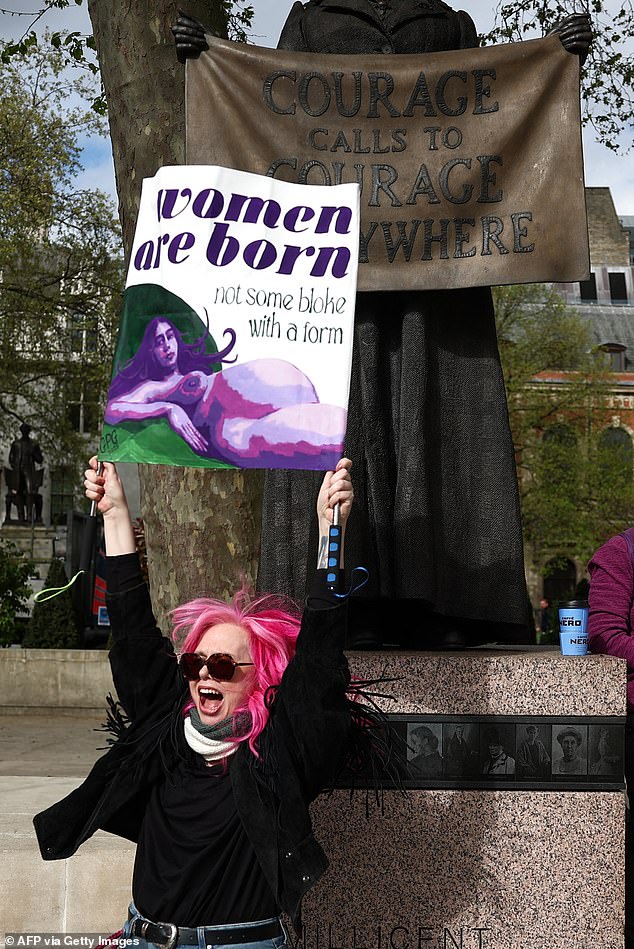
Activists celebrate after hearing the outcome of the Supreme Court’s ruling on how to define a ‘woman’
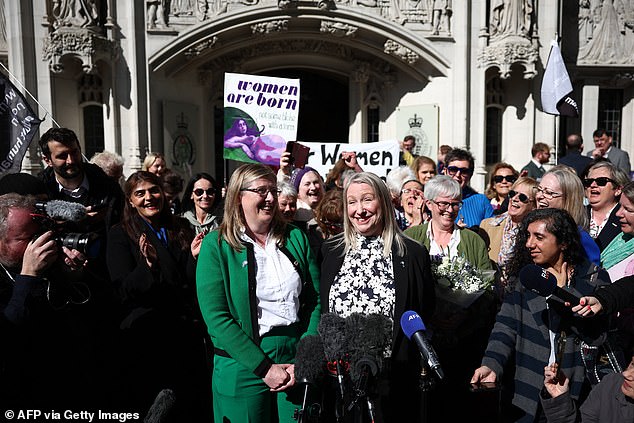
Susan Smith (L) and Marion Calder, Directors of For Women Scotland, make a statement outside the Supreme Court
Ceri Williams, from Labour Women’s Declaration, told the Mail: ‘The Labour Government has repeatedly stated its commitment to the single-sex exceptions in the Equality Act for biological women. It was in their manifesto.
‘The work starts today to make sure that all governments departments and public bodies review and revise all their policies to bring them in line with this common sense judgement from the Supreme Court.’
And Former SNP MP Joanna Cherry KC said former Scotland First Minister Nicola Sturgeon owes her an apology.
‘I’m a long-term feminist. I’m a lesbian who came out in the ’80s and campaigned against Section 28,’ she said.
‘I’ve had to put up with my own party leader, Nicola Sturgeon, calling me a bigot and a transphobe for sticking up for the rights of women and lesbians.
‘I think she owes all of us, not just me, and more importantly the women of Scotland, an apology.’
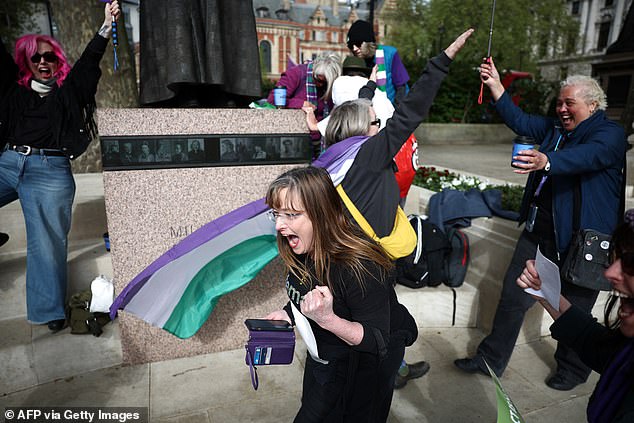
Activists celebrate after hearing the outcome of the Supreme Court’s ruling on how to define a ‘woman’
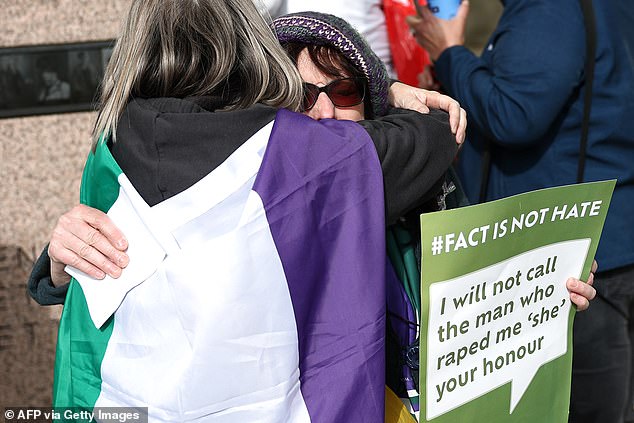
Women celebrate the verdict and hug one another. A placard reads: ‘I will not call the man who raped me ‘she’ your honour
In an 88-page judgment, Lord Hodge, Lady Rose and Lady Simler said that while the word ‘biological’ does not appear in the definition of man or woman in the Equality Act, ‘the ordinary meaning of those plain and unambiguous words corresponds with the biological characteristics that make an individual a man or a woman’.
The justices added that interpreting biological sex with GRCs would ‘cut across the definition of the protected characteristic of sex in an incoherent way’.
They continued: ‘We can identify no good reason why the legislature should have intended that sex-based rights and protections under the EA 2010 should apply to these complex, heterogenous groupings, rather than to the distinct group of, biological, women and girls, or men and boys, with their shared biology leading to shared disadvantage and discrimination faced by them as a distinct group.’
The justices said that transgender people are still protected from discrimination, but that ‘gender reassignment and sex are separate bases for discrimination and inequality’.
They said: ‘This conclusion does not remove or diminish the important protections available under the Equality Act 2010 for trans people with a GRC as we have explained.
‘To the contrary, this potentially vulnerable group remains protected in the ways we have described.’
Their judgement also ruled that the certificated sex interpretation would have ‘rendered meaningless’ a section of the 2010 Equalities Act dealing with protection from discrimination on the grounds of sexual orientation.
This interpretation would mean ‘a trans woman (a biological male) with a GRC (so legally female) who remains sexually oriented to other females would become a same-sex attracted female, in other words, a lesbian’ and would lead to an ‘inevitable loss of autonomy and dignity for lesbians’ as well as impacting lesbian clubs and associations.
The judgment continues: ‘Read fairly, references to sex in this provision can only mean biological sex. People are not sexually oriented towards those in possession of a certificate.’
A Government Spokesman said: ‘We have always supported the protection of single sex spaces based on biological sex.
‘This ruling brings clarity and confidence, for women and service providers such as hospitals, refuges, and sports clubs.
‘Single sex spaces are protected in law and will always be protected by this government.’
The Gender Representation on Public Boards (Scotland) Act 2018 is a piece of legislation intended to increase the proportion of women on public boards in Scotland.
In 2022, FWS successfully challenged the original act over its inclusion of trans women in its definition of women.
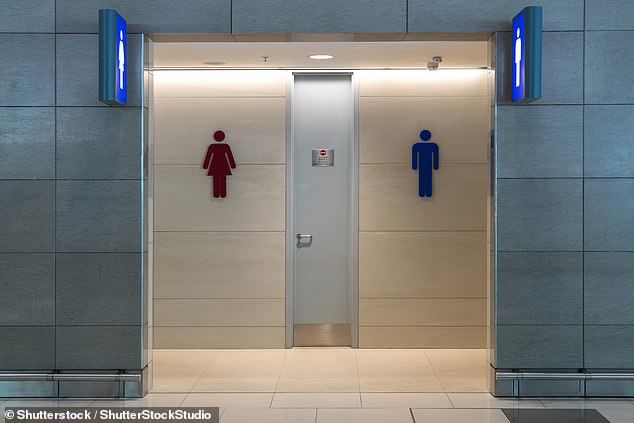
The judgement could have far-reaching implications on how sex-based rights apply, including how women-only spaces are allowed to operate
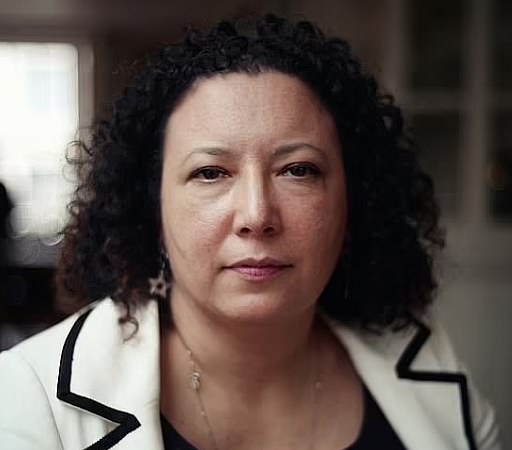
Maya Forstater, chief executive of human rights charity Sex Matters which intervened in the case, also said she is ‘delighted’ by the outcome
The Court of Session ruled that changing the definition of a woman in the act was unlawful, as it dealt with matters falling outside the Scottish Parliament’s legal competence.
Following the challenge, the Scottish Government dropped the definition from the act and issued revised statutory guidance – essentially, advice on how to comply with the law.
This stated that under the 2018 Act the definition of a woman was the same as that set out in the Equality Act 2010, and also that a person with a GRC recognising their gender as female had the sex of a woman.
FWS challenged this revised guidance on the grounds sex under the Equality Act referred to its biological meaning and said the Government was overstepping its powers by effectively redefining the meaning of ‘woman’.
However, their challenge was rejected by the Court of Session’s Outer House on December 13, 2022.
The Inner House upheld that decision on November 1, 2023 – but did grant FWS permission to appeal to the UK Supreme Court.
The appeal at the Supreme Court before Lord Reed, Lord Hodge, Lord Lloyd-Jones, Lady Rose and Lady Simler was heard last November and, after the two-day hearing, the judges said they would ‘take time to consider very carefully’ before issuing the judgment on April 16.
During the hearing, Aidan O’Neill KC, for FWS, told justices the Scottish ministers’ position that sex, man and woman in the Equality Act refer to ‘certificated sex’- as the sex on a person’s birth certificate which could be amended by a GRC – is ‘just wrong and should be rejected by the court’.
But Ruth Crawford KC, for the Scottish Government, said a person who becomes a woman ‘in consequence of a GRC’ is entitled to those protections ‘just as much as others enjoy those protections who are recorded as a woman at birth’.
She also said the ‘inevitable conclusion’ of the FWS challenge is that trans women with GRCs would ‘remain men until death for the purposes of the Equality Act’.
The court was also told that since the Gender Recognition Act was passed in 2004, 8,464 people in the UK had obtained a GRC.
When the group’s legal argument was published ahead of the appeal last year, FWS director Trina Budge said: ‘Not tying the definition of sex to its ordinary meaning means that public boards could conceivably comprise of 50% men, and 50% men with certificates, yet still lawfully meet the targets for female representation.
‘However, the ramifications of this case are much more far-reaching and all sex-based rights protected by the Equality Act are at risk.
‘The stakes are high and the court’s decision will have consequences for everyday single-sex services such as toilets and hospital wards.
‘It will determine whether a pregnant woman with a GRC is entitled to maternity leave, what it means to be same-sex attracted, and whether a man with a GRC’s entitlement to join a group of lesbians takes priority over their right to freely associate with only women.
‘Trans rights are protected under the separate category of gender reassignment but to fully guarantee women’s rights it is increasingly clear that a consistent, biological and factual understanding of sex is the only workable solution.’


